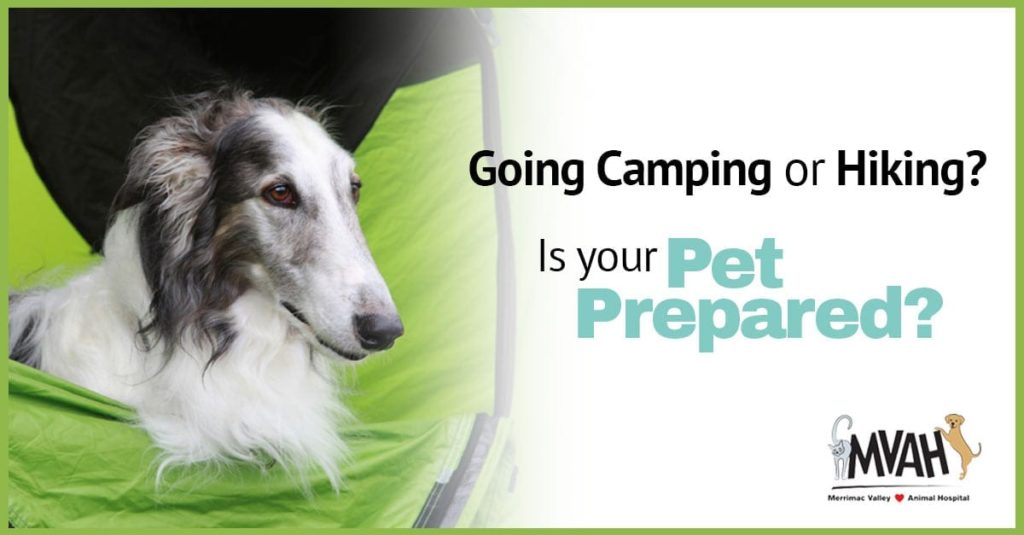Five Ways to Keep Your Pet Safe this Summer
Bag the tent, pack the bug spray, ice the cooler, and don’t forget the leash! As you make plans for your summer trips with your pet, it’s important that you be well prepared. Merrimac Valley Animal Hospital has put together a list of five tips for how to keep your pet companion safe during those outdoor summer excursions. If you have any questions or need to schedule an appointment before your trip, feel free to contact us.
1) Pack a Pet First Aid Kit
Having a pet first aid kit on hand is one of the best ways to be prepared for potential pet accidents and injuries. Since there are many conditions that may require immediate attention, having a kit and knowing basic first aid can reduce the risk of infection and even save your pet’s life. Make sure your kit includes Merrimac Valley Animal Hospital’s phone number (978-388-3074), the number of the closest emergency veterinarian to your destination, your contact information, and your pet’s information. Your kit should also include medical supplies (tweezers, cotton balls, gauze, etc.).
2) Keep Your Pet’s Vaccinations Updated
Ticks and other parasites can pose a threat to pets, especially outdoors, so it’s important to keep your pet’s vaccinations up-to-date so they can be protected from parasitic diseases. Some of the most common parasitic diseases that pets are at risk for include Lyme disease (caused by ticks) and heartworm disease (caused by mosquitoes).
Another outdoor danger that pet vaccinations can provide protection against is an infectious disease known as leptospirosis, which is caused from a bacteria that’s spread through the urine of infected animals. This infected urine can survive in water or soil for weeks or even months, so avoid letting your pet drink stagnant water in the woods during walks and hikes
Last but certainly not least is the threat of rabies. Rabies is a viral disease that’s spread through the bites or scratches of infected animals. It can also be transferred by the animal’s saliva. With rabies vaccinations, you can decrease the risk of rabies for your pet, should they ever come in contact with a rabid animal. If you are unsure if your pet’s vaccinations are updated, give us a call at (978) 388-3074.
3) Always Consider Your Pet’s Comfort
Your pet may have four legs, but they can still get tired after an extended hike. Make sure to take breaks during your hikes if your pet’s pace starts to slow down or if they start panting heavily. Consider the ground as well, as some terrain can be uncomfortable for a pet’s paws. If you’ll be camping with your pets, always keep them in the tent with you, where they can be both safe (from parasites and potential nocturnal predators) and comfortable. And don’t forget to bring an extra blanket for your pet to sleep on, too! If your pets appears to be uncomfortable for any reason, whether it’s related to heat, terrain, or exhaustion, attend to them immediately.
4) Keep Your Pet Cool and Hydrated
This is important both outdoors and in the car, since the interior car temperature can quickly reach dangerous levels in a matter of minutes. As a rule of thumb, never leave your pet alone in a car in the summer time. While your pet is outdoors, have plenty of cool, fresh water on hand, and provide as much shade as possible, so they can stay cool and hydrated. Remember to bring a bowl, too! There are many portable options available.
5) Don’t Forget the Flea and Tick Control!
Fleas and ticks thrive in warmer climates and can cause a number of health problems for pets, ranging from flea allergy dermatitis, Lyme disease, and anemia. To protect your pets, Merrimac Valley Animal Hospital recommends that you provide them with a year-round parasite preventative. This is especially important before your outdoor trips. We can make recommendations on the best preventatives for your pet, so call us today at 978-388-3074 to learn more or to schedule an appointment.
Recent Posts
About Us
Merrimac Valley Animal Hospital had humble beginnings in 1968. Dr. Walter Brown opened the animal hospital in a garage next to his home near the current hospital and operated out of this small space until the current building was built in 1969.

